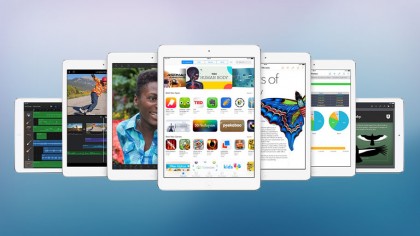The demise of the tablet has been greatly exaggerated
iPads, tabs and phabs are here to stay

Sign up for breaking news, reviews, opinion, top tech deals, and more.
You are now subscribed
Your newsletter sign-up was successful
The argument goes something like this: Apple dominated the tablet market, but now it's selling fewer iPads, so it will make a six-inch phablet instead. While many are jumping to conclusions that this means tablets are dead the facts show that the tablet's demise has been greatly exaggerated.
This doesn't mean that that Apple won't add a bigger phone to its arsenal. The rumours that Apple will produce a bigger iPhone won't go away, largely because the oversized phone/tablet (or phablet, if you really must) is massive in Asia, where Samsung is preparing to release a whopping seven-inch device.
Does this mean we are living in a post-iPad era, though? Ronan Cremin, CTO of mobile web company dotMobi doesn't think so, not yet at least.
"We have not reached the post-iPad era, though Apple and the iPad no longer dominate the competition," he says. "Our device usage figures show strong growth in Android use across the globe with 2,190 different Android-based tablets being tracked."
In short, it's starting to be all about Android. Over 195 million tablets were sold worldwide in 2013, an increase of a massive 68% on 2012, but it's Android tablets that are taking over.
In 2012 Android held 46% of the market. By 2013 that figure had grown to 62%. Apple closed 2013 with a 36% stake in the tablet space - and declining. "Of the 101 countries across the world where data is tracked, iOS devices dominated browsing in 34, while Android comes out on top in some 67 nations," confirms Cremin.
Whatever the operating system though, it's pretty obvious that we're all crazy about tablets.
Sign up for breaking news, reviews, opinion, top tech deals, and more.
iPads 'unlikely to go away'
The tablet trend-setter, however, shouldn't be written off. "The iPad still represents a beautifully produced and highly intuitive state-of-the-art product in the midst of the Apple device ecosystem, that is unlikely to go away anytime soon," says Jeremy Silver, ex-EMI and Virgin Records music industry executive, advisor to the UK Technology Strategy Board and author of Digital Medieval.

"Never underestimate Apple's willingness to adapt," he says. "The splitting of the iPhone 5 into the iPhone 5S and iPhone 5C-class phones was the kind of thing Steve Jobs swore that the company would never do, but with consumer behaviour changing extremely quickly, Apple will be looking to adapt and advance in as many innovative ways as it can."
But perhaps iPad isn't as far behind its rivals as it might appear. The tablet trading industry in the UK is still in its infancy, but it's so far all about the iPad.
"A week after the iPad Air launch we saw a 585% increase in trade-ins, as gadget fans rushed to recycle their old devices in exchange for the new one," says Keir McConomy, founder of SellMyMobile.com.
The most traded in tablet this year at Sellmymobile.com is the Apple iPad 2 16GB, followed by the Cellular version, the Apple iPad 3 16GB, the Apple iPad Mini 16GB and the Apple iPad 4 16GB.
Surrounded entirely by Apple devices, the Samsung Galaxy Tab 2 stands alone in seventh position. "Android users hang on to their tablets longer than they do with smartphones," says McConomy, whose business is picking up. He says that before 2013 there were surges in trade-ins only around big smartphone launches, not tablets.
Pensioners love tablets
The iPad may have peaked, but the tablet certainly has not. Ofcom reported last month that in the preceding year there was a three-fold increase in the use of tablet computers going online in the UK.
Ofcom's Adults' Media Use and Attitudes Report found that an increased use of tablets was behind a 25% increase in the number of people aged 65 and over accessing the internet.

In the 65-74 age group alone the use of tablets shot up from 5% in 2012 to 17% in 2013, though in the population at large almost a third of us use a tablet.
However, there are some clues in the report that tablets just aren't as sticky as smartphones. Ofcom found that the device that people "would miss most" is the smartphone, at a whopping 42%. Next comes the TV. The tablet's nowhere in sight.
Trading figures follow that trend, too. "We're still not seeing the same volume of trade-ins around tablet devices as we do for smartphones," says McConomy.
Does that merely suggest that people are holding on to their tablet devices for longer than they are with smartphones?
"This may be because tablets are standing the test of time from a tech perspective, and people aren't as hungry to trade them in," says McConomy. "Or it may be because tablets tend to be shared devices, so they may be passed down to other family members over time, or just held onto as spare devices around the house."

Jamie is a freelance tech, travel and space journalist based in the UK. He’s been writing regularly for Techradar since it was launched in 2008 and also writes regularly for Forbes, The Telegraph, the South China Morning Post, Sky & Telescope and the Sky At Night magazine as well as other Future titles T3, Digital Camera World, All About Space and Space.com. He also edits two of his own websites, TravGear.com and WhenIsTheNextEclipse.com that reflect his obsession with travel gear and solar eclipse travel. He is the author of A Stargazing Program For Beginners (Springer, 2015),